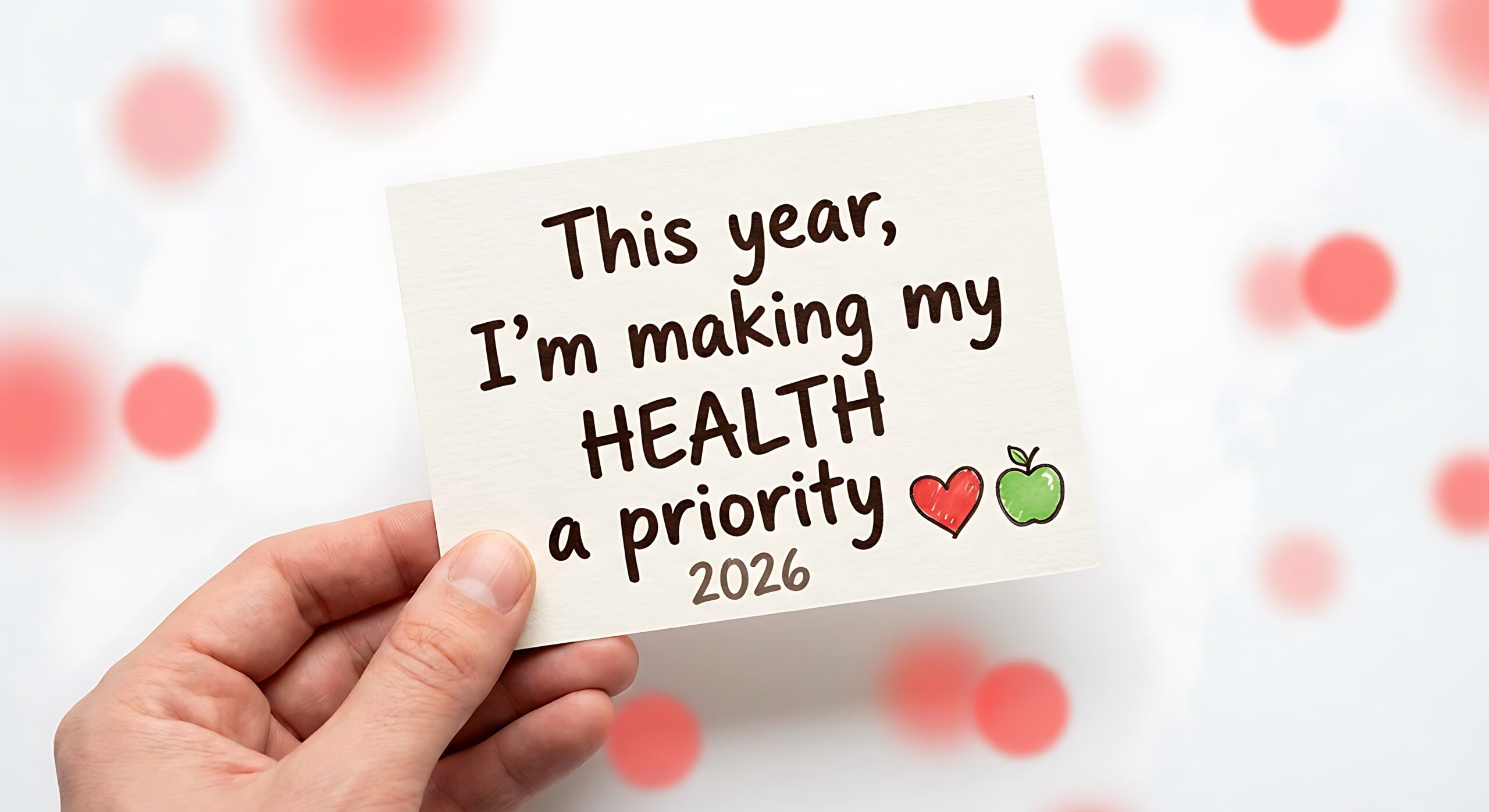Is the cart before the horse in your weight loss efforts?
If you’re trying to drop pounds but haven’t addressed your slow metabolism, you’re working in the wrong order. Use today’s tips to fix your metabolism to make your weight loss efforts much easier.
What Exactly is Your Metabolism?
Your metabolism is the chemical process inside your body that converts food (or calories) into energy to keep you alive. The speed of your metabolism (or how many calories your body needs to function) is mostly determined by your age, gender, and genetics. However, there are factors that can slow down your metabolism and a few proven ways to increase it.
What can you do about a slow metabolism?
You can mend your metabolism! Here’s how:
- Review the following six symptoms to see if your metabolism is sluggish.
- Identify the reasons why your metabolism is lagging behind.
- Apply my six-step process to restore your metabolism.
6 Symptoms of a Slow Metabolism
A slow metabolism is a chronic issue for many people. If you have these symptoms, you might be one of them:
1. Low Energy
With a slow metabolism, the process of breaking down food and turning it into energy will be slower, diminishing your overall energy levels. As a result, many people with slower metabolisms report experiencing chronic fatigue or lethargy. If you have a slow metabolism, you may feel sleepy, groggy, or worn out very easily.
2. Constipation and Bloating
A sluggish metabolism results in a slowdown of the entire digestive process, which leads to constipation. Constipation can then cause bloat and chronic inflammation throughout your digestive system. If you’re suffering from bloat and backup, a slow metabolism could be to blame.
3. Feeling Continuously Cold
Feeling cold all the time is a common symptom of hyperthyroidism—one of the main causes of a slow metabolism. Metabolic activity creates heat within your body, but a decrease in this activity leads to a drop in your core body temperature. If you’re grabbing for heated blankets while others are comfortable around you, it could be a sign of a slow metabolism.
4. Hormone Imbalance
Our hormones and metabolism are intricately intertwined. Age, nutrition, illness, and stress can all affect both our hormone balance and metabolic rate. If you’re experiencing weight gain in addition to other imbalanced hormone symptoms (like irregular periods) your metabolism might be slow too.
5. Weight Gain
Diet and exercise are the two most critical factors that determine your weight. But if you’re doing everything right and the weight just won’t come off, your metabolism might be lagging. A slow metabolism burns fewer calories, causing your body to store additional fat.
6. Brain Fog
Your brain needs the nutrients your body absorbs from food. But if your metabolism is sluggish and is slowing down that nutrient-to-energy conversion, you may experience brain fog. Brain function, concentration, and alertness can all fall behind when your metabolism is too slow.
8 Common Causes of a Slow Metabolism
Do you relate to these symptoms? These eight factors could be at the root of your slow metabolism:
1. Under Eating
If you don’t eat enough food, your body will sense that food is scarce and adjust by slowing your metabolism down. Extreme diets (for example, eating fewer than 1,000 calories per day) can significantly impact your metabolic rate. This lifestyle will train your body to survive on fewer calories, causing it to cling to the few it receives. Dropping your daily calories too low, therefore, can actually be counterproductive for weight loss.
2. Low Muscle Mass
One of the variables that affect your metabolic rate is the amount of lean muscle you have on your body. The more muscle and less fat comprise your body, the higher your metabolic rate. People who have more muscle mass burn more calories, even while at rest. Lower muscle mass, though, leads to a slower metabolism and even becomes a risk factor for metabolic syndrome as we age.
3. Hormone Imbalance
Your thyroid secretes hormones that regulate your metabolic rate and determine how efficiently your metabolism functions. If these hormones are out of balance, you may experience hair loss as a woman, irregular menstrual cycles, ongoing fatigue, depression, anxiety, or a weakened immune system. Talk to your doctor about getting your thyroid checked if you are experiencing these symptoms.
4. Chronic Stress
Cortisol—the hormone our body produces when we’re stressed—sends our bodies into a fight-or-flight mode. While in this mode, your body focuses on addressing the threatening situation and temporarily pauses certain physical functions, like digestion. While a single bout of stress may temporarily raise your heart rate and increase your metabolism, chronic stress causes a long-term drop in your metabolism.
5. Sitting All Day
A sedentary lifestyle can lead to a significant decrease in how many calories you burn daily. Simply standing up, stretching, working at a standing desk, or taking a lap every hour can help increase your metabolism.
6. Poor Sleep
Sleep loss and sleep disorders significantly impact metabolism. Sleep affects both your metabolism and the hormones responsible for regulating your metabolism. A lack of quality sleep will make you metabolically groggy and diminish your body’s ability to convert food into energy.
7. Poor Hydration
Dehydration can compromise the efficiency of most body functions, including your metabolism. While dehydrated, your digestive system and your metabolism slow down. On the flip side, drinking about 2 cups of water before a meal may increase your metabolic rate by up to 30%.
8. Taking Certain Medications
Some medications like antidepressants, diabetes drugs, steroids, and hormone therapies may cause your metabolism to slow down. Your doctor may be able to prescribe a different medication or change your dosage to help combat any metabolic effects and resulting weight gain.
6 Steps to Repairing Your Metabolism
Improving your metabolism before you tackle weight loss with these six steps:
- Start Strength Training: Add more muscle mass to boost your metabolism. The more muscle you have on your body, the more calories you burn even while resting!
- Eat More Protein: Your body burns more calories (maybe even twice as many) when it’s digesting protein compared to carbs or fat.
- Try Reverse Dieting: Slowly adding calories back into your diet over the course of 2 to 4 months can train your body to maintain its current weight while consuming more food. If you’re new to reverse dieting, check out my guide, which will walk you through exactly what steps you need to take to avoid weight gain while increasing your calories.
- Prioritize Quality Sleep: When you catch those quality Z’s, your physical and mental health flourishes! To keep your metabolism revved, don’t skip snoozing. Here’s how to hack your sleep for quality health.
- Reduce Stress: Laughter, connection with others, sleep, physical activity, meditation, and professional counseling can do wonders for our stress levels! Check in with how frequently you feel stressed throughout the week, and make it a priority to find relief.
- Boost Your Hydration: Make sure that you’re drinking at least 64 oz. of water every day to stave off dehydration and a slowed metabolism. You can even give your body a boost by drinking electrolyte water.
How to Measure Your Metabolism
Do you have the 6 signs of a slow metabolism? It may be time to get tested.
Your resting metabolic rate (RMR) or basil metabolic rate (BMR) measures how many calories your body burns at rest or while performing its most basic functions. You can find your precise BMR and RMR in a laboratory setting with a breathing test called a calorimeter.
Recent tools, like Lumen, allow you to administer this test at home. Alternatively, you could use the Mifflin-St Joer formula to find an estimate of your metabolism.
After determining your BMR, try out the 6 solutions above and start repairing your metabolism. Once your metabolism is back to normal, weight loss becomes much easier.
For more practical tips on how to boost your health and wellness, sign up for my weekly newsletter. If you’re looking to kick your weight loss and health into high gear, it’s time you joined my LEAN program. See what others have to say about LEAN here.



